A Guide To Driving Revenue Through B2B Content Marketing
December 19, 2023
Sarvesh Bagla
What has changed from the original post:
- Replaced ‘What Might Change for B2B Marketers?” with Intro
- Replaced ‘What might change for B2B sales teams?” with Importance of B2B sales
- Renamed ‘7 Ways to Increase B2B Sales with Content Marketing’ to ‘Effective B2B Content Marketing Strategies’ and added more content to the section
- Added ‘Future Trends in B2B Marketing’ section
- Added ‘Final Thoughts’ section
Summary: Discover the power of content marketing in driving B2B sales in this insightful post. We delve into effective strategies for creating engaging, informative content that resonates with your business audience. Learn how to leverage various content formats like whitepapers, case studies, and blogs to establish thought leadership and build trust with potential clients.
B2B content marketing is a strategic approach aimed at producing and sharing valuable, relevant, and consistent content to captivate and maintain a well-defined business client audience. This differs from B2C (Business-to-Consumer) marketing, which focuses on individual consumers, as B2B content marketing addresses the needs and challenges of individuals
who are making purchases on behalf of, or for, their organization.
Overall, B2B content marketing revolves around crafting content that assists businesses in resolving issues or making informed decisions, ultimately fostering a business relationship.
What is B2B Content Marketing?
Business-to-business (B2B) content marketing involves strategically crafting and sharing content tailored for other companies or organizations. The goal is to draw in, engage, and eventually turn target audiences into leads and paying customers. This approach focuses on delivering value specifically to other businesses.
Here’s a breakdown of the key aspects:
What it is:
1. Content creation
This process encompasses diverse formats such as blog articles, detailed white papers, insightful case studies, informative eBooks, engaging infographics, interactive webinars, podcasts, and video content.
2. Content distribution
This involves disseminating your content across various platforms, including your website, social media channels, email marketing campaigns, publications in your industry, and relevant online communities.
3. Focusing on businesses
In contrast to B2C marketing which targets individual consumers, B2B marketing is aimed at influencing decision-makers and key players within specific businesses.
4. Adding value
Your content should directly address and provide solutions for the specific challenges, pain points, and needs of your target audience, offering valuable insights and expert knowledge.
The goals of B2B content marketing:
1. Enhance brand recognition
Elevate your company’s profile and establish its presence in your specific market sector.
2. Acquire potential clients
Draw in prospective customers by providing valuable materials in return for their contact details.
3. Cultivate prospective client relationships
Develop connections with these potential clients, inform them about your offerings, and guide them toward the purchasing process.
4. Position as an industry expert
Set your business apart as a knowledgeable and authoritative leader in your field, thereby enhancing trust and reliability.
5. Boost revenue: The primary objective is to transform these potential clients into actual buyers, thereby increasing your company’s profitability.
Examples of B2B content marketing:
- A technology firm publishing an article about current trends and optimal strategies in the software industry.
- A company specializing in financial services conducting an online seminar on effective business financial management.
- An industrial corporation issuing a detailed report on recent technological innovations in manufacturing.
- A marketing firm presenting a collection of case studies that highlight the achievements of their client projects.
Essential Components of B2B Content Marketing
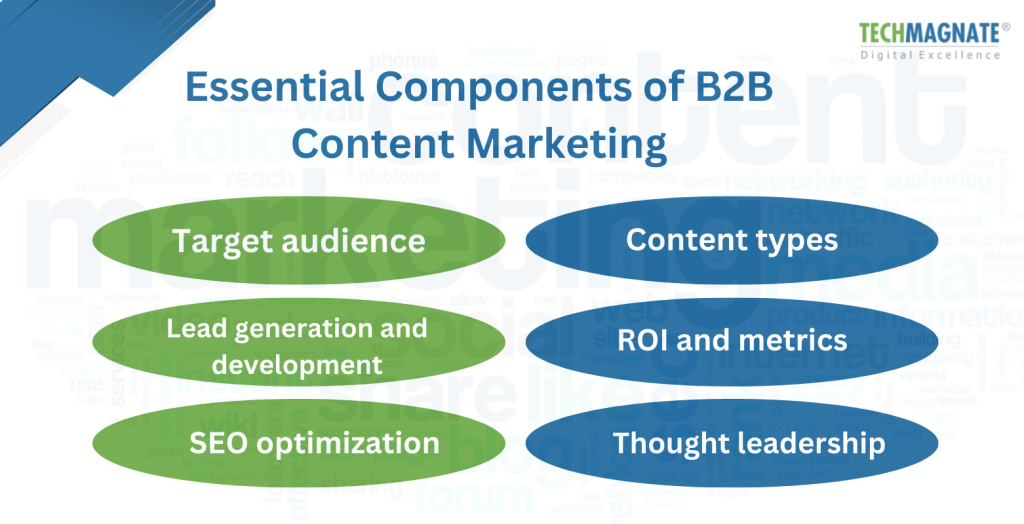
1. Target audience
The content is geared towards business decision-makers, addressing their unique needs, challenges, and pain points different from those of individual consumers.
2. Content types
This includes blogs, whitepapers, case studies, research reports, webinars, and informational videos. These formats are chosen for their effectiveness in communicating complex information and establishing thought leadership.
3. Lead generation and development
The goal is to generate leads (potential sales contacts) and nurture these leads through the sales funnel. Content in B2B marketing is used to build trust, establish credibility, and position the company as an expert in the field.
4. ROI and metrics
The success of B2B content marketing is often measured in terms of return on investment (ROI), lead quality, website traffic, and engagement metrics.
5. SEO optimization
Ensuring content is discoverable through organic search via search engine optimization is vital.
6. Thought leadership
Positioning the company or its senior management as industry experts is crucial to influencing purchasing decisions and distinguishing the business from its competitors.
Overall, B2B content marketing revolves around crafting content that assists businesses in resolving issues or making informed decisions, ultimately fostering a business relationship.
Additional Read: What is SEO
How B2B Content Marketing Benefits You
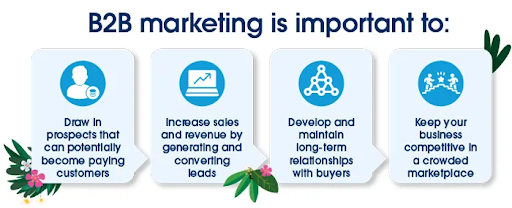
Source: salesforce
Based on the most recent B2B Content Marketing Benchmarks, Budgets, and Trends study conducted by Content Marketing Institute and MarketingProfs, 71% of participants indicate that B2B content marketing has increased in significance for their organizations in the past year.
In contrast, only 4% report a decrease in importance. The findings underscore the critical role of documenting a B2B content marketing strategy, as 64% of high-performing respondents affirm having a documented strategy, in stark contrast to the 19% among the least successful.
1. Driving business growth
B2B sales play a crucial role in fueling the expansion and financial success of businesses catering to other enterprises. Unlike B2C (Business-to-Consumer) sales, B2B transactions typically entail larger deal sizes and extended contract durations.
2. Building long-term relationships
B2B sales centers around cultivating long-term connections with clients, aiming for sustained business relationships that foster repeat transactions and a consistent revenue flow.
3. Customized solutions
B2B sales often involve providing customized solutions that cater to specific business needs, leading to a deeper engagement with the client.
4. Building trust and credibility
Creating high-quality content is crucial in positioning a business as a thought leader and expert within its industry. This holds particular significance in the realm of B2B, where decision-making frequently hinges on the perceived expertise and dependability of the service provider.
5. Supporting the buyer’s journey
B2B purchasing decisions are typically complex and involve multiple stakeholders. Effective content marketing provides valuable information at each stage of the buyer’s journey, helping potential customers make informed decisions.
6. Enhancing online visibility and SEO
Consistently publishing content that is both informative and rich in keywords enhances the search engine rankings, thereby making it easier for prospective clients to discover your business on the internet.
7. Lead generation and nurturing
Strategic content marketing attracts potential customers and nurtures them through the sales funnel. By addressing their specific needs and challenges, content can convert prospects into leads and, eventually, customers.
8. Educating your audience
B2B offerings often involve complex features. Content marketing plays a crucial role in simplifying intricate concepts and informing prospective clients about product details, services, and prevailing industry trends.
9. Cost-effectiveness
In contrast to conventional marketing methods, content marketing frequently presents a more economical alternative with the potential for a greater return on investment (ROI). It enables precise audience targeting and engagement.
10. Feedback and insights
Interacting with audiences via content empowers businesses to acquire valuable feedback and glean insights into customer requirements and industry trends, shaping informed strategies for the future.
11. Adaptability to market changes
Content marketing is adaptable and can quickly respond to market changes, allowing businesses to stay relevant and up-to-date in their communications.
B2B Content Marketing Strategies For Increased ROI
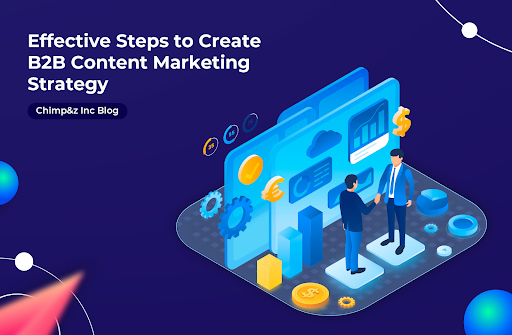
Source: chimpandzinc.com
Content marketing in the Business-to-Business (B2B) sector requires a different approach than in the Business-to-Consumer (B2C) sector. Here are some key B2B content marketing strategies to consider:
1. Understand your audience
In B2B, your interactions are generally with professionals who prioritize efficiency, expertise, and value-added solutions. Gain insights into their challenges, identify their pain points, and recognize the aspects they value in a product or service.
2. Create valuable content
Ensure that your content is both informative and educational, catering to the specific interests of your audience. Focus on developing whitepapers, case studies, industry reports, and blog posts that not only offer valuable insights but also present practical solutions to address the challenges faced by your audience.
Additional Read: Steps to a Successful SEO Content Strategy
3. Leverage thought leadership
Establish your brand as a thought leader in your industry. Share expert opinions, in-depth analysis, and forward-thinking perspectives. This can be through articles, webinars, or speaking engagements.
4. Focus on SEO and keywords
Ensure your content is discoverable online. Use SEO best practices and target keywords that your audience is likely to search for.
5. Utilize social media and professional networks
Use popular social platforms such as LinkedIn for B2B marketing purposes. Share engaging and informatics content, interact with fellow industry professionals, and establish a robust network.
6. Email marketing
Utilize email marketing for lead nurturing by sending newsletters, delivering exclusive content, and engaging in personalized communication. This approach helps maintain your brand’s prominence in the minds of your audience.
7. Measure and analyze performance
Regularly analyze the performance of your content. Use metrics like engagement, click-through rates, and conversion rates to understand what works and what doesn’t.
8. Personalization and customization
Customize your content for various audience segments to enhance its relevance and effectiveness.
9. Video and interactive content
Integrate video content along with interactive elements such as quizzes and polls to enhance audience engagement on a deeper level.
Additional Read: Video Marketing Strategies For Lead Generation
10. Partnerships and collaborations
Collaborate with other businesses or influencers in your industry to broaden your reach and add credibility to your content.
11. Case studies and testimonials
Highlight success stories and client testimonials to enhance credibility and showcase the value of your products or services.
12. Consistent and regular posting
Maintain a consistent schedule for content posting. This helps in building a loyal audience and improves brand recall.
Role of Content Marketing in a B2B Buyer Journey
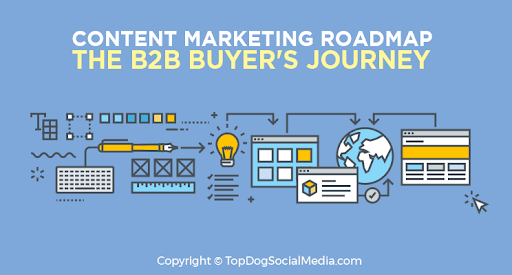
Source: topdogsocialmedia.com
Content marketing plays a crucial role in the B2B buyer’s journey, which typically involves a more complex decision-making process compared to B2C. Here’s how B2B content marketing impacts different stages of the journey:
Awareness stage
1. Educating potential customers
In this phase, prospective clients may lack awareness of existing issues or requirements. Content marketing serves as a valuable tool by delivering informative content, such as blog posts, whitepapers, or industry reports, to enlighten them about challenges and potential solutions. This, in turn, enhances awareness of the brand’s offerings.
2. Building thought leadership
High-quality, informative content positions the company as a thought leader in its industry, increasing trust and credibility.
Consideration stage
1. Nurturing leads
After potential customers have identified their needs, content marketing plays a crucial role in cultivating these leads. Utilizing case studies, webinars, and comprehensive articles can provide detailed insights into how the company’s solutions effectively tackle specific business challenges.
2. Differentiation from the competitors
Through unique and compelling content, a business can differentiate its solutions from competitors, highlighting unique value propositions.
Decision stage
1. Influencing the purchase decision
At this point in the decision-making process, content such as in-depth product comparisons, customer testimonials, and demonstration videos can significantly impact and sway the ultimate buying decision.
2. Providing proof points
Success stories and customer testimonials provide proof of the effectiveness of the solutions, easing decision-making for the buyer.
Post-purchase stage
3. Building customer loyalty and advocacy
Post-purchase, the significance of content marketing continues in guaranteeing customer satisfaction and fostering loyalty. Providing educational content, best practices, and ongoing support resources contributes to the cultivation of a lasting relationship.
4. Upselling and cross-selling
Through tailored content, existing customers can be informed about other relevant products or services, leading to upselling or cross-selling opportunities.
Future Trends in B2B Content Marketing
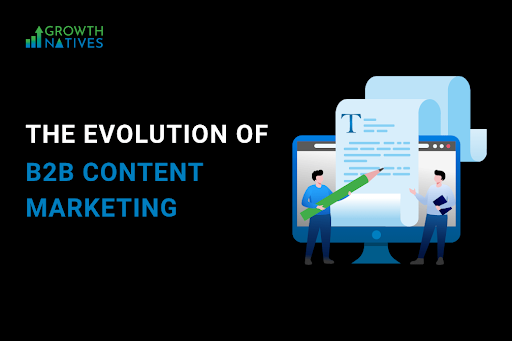
Source: growthnatives.com
The future of B2B content marketing is likely to be shaped by several key trends, reflecting the evolving digital landscape and changing business needs. Here are some of the trends that are expected to influence B2B content marketing in the coming years:
1. Increased personalization and customization
With the evolution of data analytics and artificial intelligence (AI), B2B marketers can now deliver highly personalized content. This entails crafting tailored content that addresses the distinct needs, challenges, and interests of various segments within the audience.
2. Greater emphasis on quality and relevance
A stronger emphasis will be placed on creating top-notch, relevant content. This shift is driven by the rising need to distinguish oneself in a saturated digital landscape and the rising sophistication of the audience, which seeks increasingly valuable and insightful content.
3. Leveraging AI and machine learning
AI and machine learning technologies will be used more extensively to analyze data, predict trends, and automate content creation processes. This will help in generating more effective content strategies and in optimizing content for better engagement.
4. Interactive and immersive content
Interactive features such as quizzes, polls, and augmented reality (AR) will increasingly dominate content. These elements enhance audience engagement, creating a more memorable and immersive experience.
5. Video and multimedia content
The significance of video content, such as webinars, and live streams, is poised for continual growth. The utilization of multimedia components such as infographics, podcasts, and interactive videos is also expected to rise, as they help in breaking down complex information in an engaging way.
6. Thought leadership and expertise
Establishing thought leadership through in-depth, expert content will become increasingly important for B2B brands. This could involve deep dives into industry trends, original research, and insights from company leaders or industry experts.
7. Social media and community building
Utilizing social media for content distribution and community will remain vital. LinkedIn, in particular, will continue to be a key platform for B2B marketers.
8. Content collaboration and co-creation
Collaborating with industry influencers, clients, or even competitors to co-create content can provide diverse perspectives and increase reach.
Final Thoughts
In conclusion, B2B content marketing is a vital strategy for driving revenue in today’s digital landscape. By focusing on creating high-quality, relevant, and engaging content, businesses can establish trust, build relationships, and position themselves as thought leaders in their industry.
The key is to understand your audience, deliver value consistently, and leverage various content formats and distribution channels effectively. Remember, it’s not just about creating content, but about creating the right content for the right audience at the right time.
With a well-planned content marketing strategy, businesses can not only increase their revenue but also strengthen their brand and foster lasting relationships with their clients.